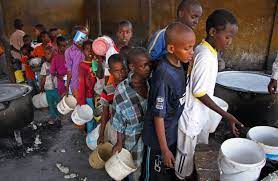ACCRA, Oct. 16 — At the pace of development and commitment African countries could meet the zero-hunger goal (Sustainable Development Goal Two ) by 2025 , Bukar Tijani Assistant Director General (AD-G) of the United Nations Food and Agriculture Organization (UNFAO) has said.
According to him, the statistics for Ghana for instance showed clearly that the country was reaching food and nutrition security.
Speaking in an interview here on Tuesday ahead of World Food Day on Tuesday , Tijani who is also the FAO Regional Representative for Africa pointed out that 2030 was not very far so efforts needed to be doubled to achieve the targets.
“On a general note I believe what is coming on, the theme for this year, ‘Our Actions, Our Future,’ means there is a lot of commitment across Africa
“I have discussed with a lot of minister across Africa where there is a lot of commitment that we can reach zero hunger. Zero hunger is possible by year 2025 for African ministers and year 2030 for the global level Sustainable Development Goal two,” Tijani maintained.
Talking about specifics in Ghana the AD-G said the indices in terms of reaching food and nutrition security was good.
In spite of the optimism, reports on the continent’s performance point to disparities between national level aggregates and sub-national level realities.
In Ghana for instance, the report on the country’s performance “The Ghana Zero Hunger Strategic Review” identified that hunger and malnutrition persisted in many parts of the country especially in the three regions in the north and many rural and peri-urban communities.
“This can increase given the unsustainable food production systems that continue to be practiced in all parts of the country,” the report stated.
The report also identified stunting among nearly 20 percent of children under-five across the country, which it explained was an indication of chronic malnutrition.
In addition to that it said 11 percent of Ghanaian children were underweight in spite of general improvement in the nutrition status of Ghanaian children since 2003.
“It is important to note that despite the progress at the national level there is a disparity at the regional level. Overweight is also gradually becoming a problem in all regions but quite significant in Greater Accra, Central and Volta Regions,” the report stated.
The FAO official explained that these phenomena cut across the African region and although the continent was moving fast towards achieving the Zero Hunger goal some of these challenges were real needing serious attention.
“ But in general terms in Africa we have quite a number of countries. We take South Africa, Botswana Namibia, Nigeria, we have actually people who are obese and it is on the increase
“This is something which we are looking at very carefully so that governments and partners will be more enlightened to deal with it,” Tijani added.
Also, he conceded that most forecasts in conflict areas and areas where accessibility for food to be distributed and produced showed that malnutrition was becoming a major problem.

